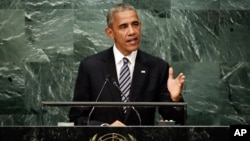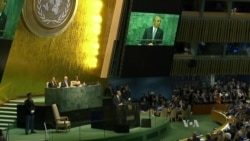In his final address at the United Nations, President Barack Obama reiterated his strong commitment to multilateralism and the world body.
“We can choose to press forward with a better model of cooperation and integration or we can retreat into a world sharply divided and ultimately in conflict along old lines of nation and tribe and race and religion,” he told leaders Tuesday.
“I want to suggest to you today that we must go forward and not backward,” he added.
Obama, who will leave office in January, spoke of progress during his eight-year tenure, including reducing extreme poverty, resolving the Iranian nuclear issue, opening relations with Cuba, and agreeing to an international deal on climate change.
“This is important work, it has made a real difference in the lives of our people, and it could not have happened had we not worked together,” he said.
Obama warned that there are deep fault lines, however, in the international order causing the massive refugee crisis, economic disruptions and insecurity.
"We see too many governments muzzling journalists and quashing dissent and censoring the flow of information," he said. "Terrorist networks use social media to prey upon the minds our youth, endangering open societies and spurring anger against innocent immigrants and Muslims.
"Powerful nations contest the constraints placed on them by international law. This is the paradox that defines our world today," Obama added.
Taking aim
On the crisis in Syria, he said there is no ultimate military victory to be won and said a diplomatic solution must be pursued.
Obama also warned that “the embers of extremism will continue to burn” in the world, but that “the world is too small for us to simply be able to build a wall” and prevent it from affecting society.
In addition the U.S. leader took aim at Russia for its interference in Ukraine and at North Korea for its defiance of the international community on the nuclear front.
WATCH: Obama on refugee crisis
Later Tuesday in New York, Obama hosted the first-ever Leaders Summit on Refugees, saying the world is facing a crisis of epic proportions.
"We are here because right now in crowded camps in cities around the world there are families from Darfur in Chad, Palestinians in Lebanon, Afghans in Pakistan, Colombians in Ecuador, who’ve endured years, in some cases, decades, as refugees surviving on rations and aid and who dream of someday, somehow, having a home of their own," he said.
During his speech to the General Assembly, Obama spoke for about 45 minutes. Traditionally, the U.S. holds the second speaking slot of the debate, but Obama arrived late to the hall and the president of the General Assembly skipped over him to the next speaker, Chadian President Idriss Deby.
WATCH: Related video report by Margaret Besheer
Ban's ire
Earlier, U.N. Secretary-General Ban Ki-moon opened the annual meeting for the final time. He leaves office after a decade at the end of this year.
Ban released years of pent up anger at leaders and countries who have contributed to suffering and conflict across the globe.
He took particular aim at Syrian President Bashar al-Assad, in the wake of an attack on a humanitarian aid convoy Monday that killed 20 people.
“Just when we think it cannot get any worse, the bar of depravity sinks lower,” Ban said. “The humanitarians delivering life-saving aid were heroes. Those who bombed them were cowards.
The United Nations has been forced to suspend aid convoys because of the attack.
A political transition is long overdue. After so much violence and misrule, the future of Syria should not rest on the fate of a single man, Ban said of Syria’s Assad.
The U.N. chief also expressed regret and sorrow for two of the biggest blights of his tenure – the cholera epidemic in Haiti and the sexual abuse and exploitation of civilians by U.N. and foreign troops in Africa.
White House correspondent Cindy Saine contributed to this report.







